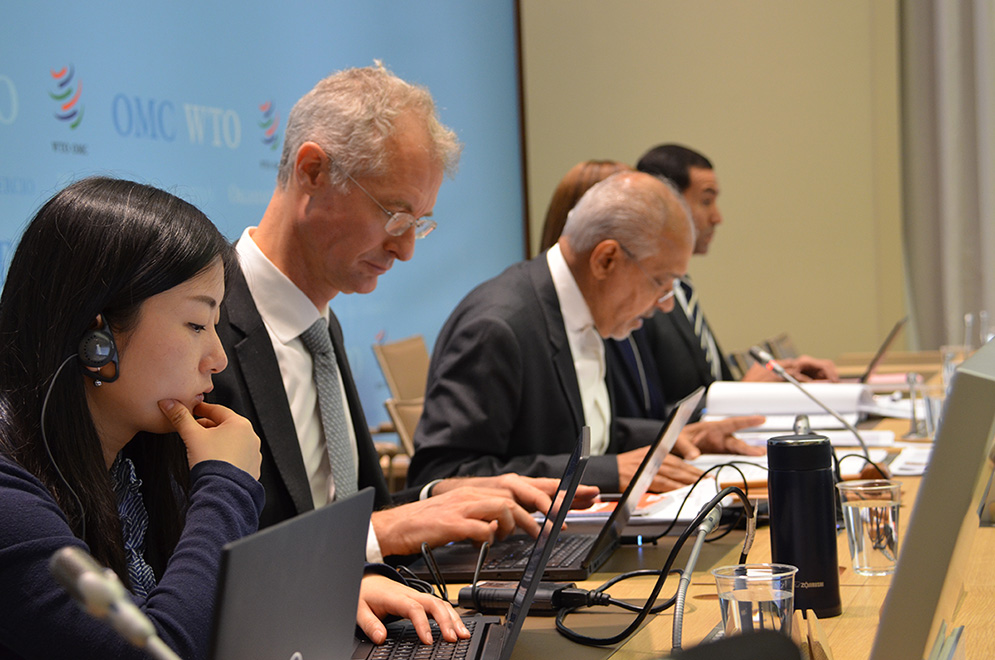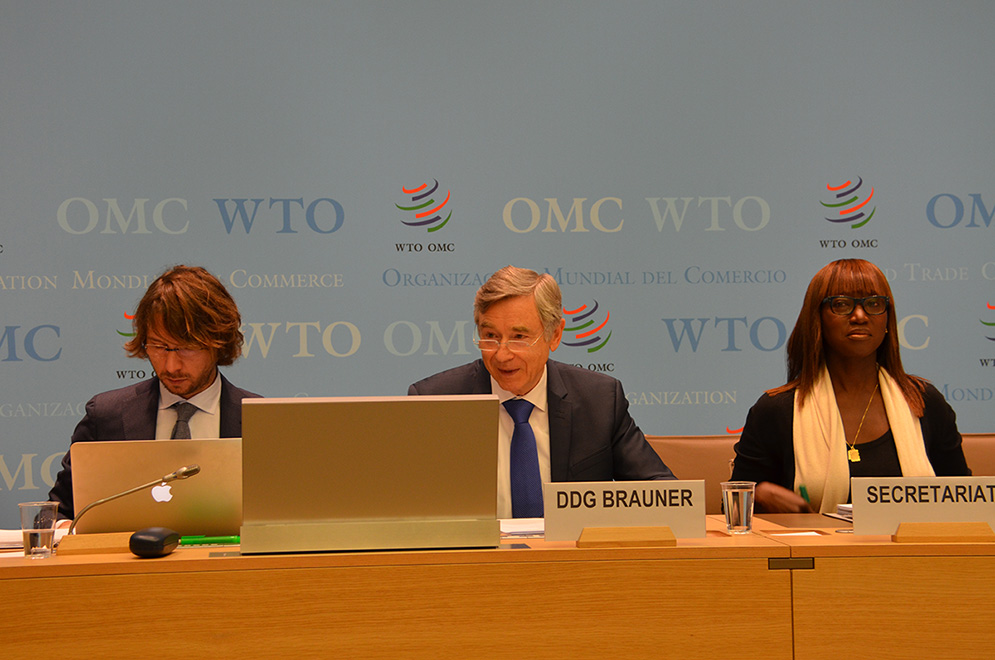COTTON SUB-COMMITTEE
More
Amb. Ford and DDG Brauner encouraged members to build on the success of World Cotton Day, with a view to achieving meaningful results by the 12th Ministerial Conference in June 2020. WTO members discussed the latest trends in trade in cotton and the state of play in cotton development projects.
Launch of World Cotton Day “made history”
Underlining the considerable scale and impact of the WTO launch of World Cotton Day, DDG Brauner said that it “will be remembered by the cotton industry and cotton farmers around the world”.
DDG Brauner stressed the importance of the Partners´ Conference, where donor agencies committed to support the WTO-UNCTAD-ITC project on cotton by-products as well as other cotton projects, both financially and technically.
Amb. Ford noted cotton's place as a “key priority” in the WTO's work. He acknowledged the “remarkable success” of the launch of World Cotton Day, which “marked once again the importance of the cotton dossier at the WTO, both on trade and development, especially for developing and least-developed countries”. Amb. Ford asked members to maintain the momentum generated by the adoption of the joint statement and to identify an approach towards meaningful landing zones in the cotton negotiations.
Recapping the event's success, the WTO Secretariat said more than 850 participants from the global cotton community attended the event at the WTO and over 6,000 stakeholders from across the world engaged globally through their own activities, email campaigns and social media participation. The partner organizations for World Cotton Day (the Food and Agriculture Organization of the United Nations — FAO; the International Cotton Advisory Committee — ICAC; International Trade Centre — ITC; the United Nations Industrial Development Organization — UNIDO; and the United Nations Conference on Trade and Development - UNCTAD) said that the event enabled stakeholders along the cotton value chain to build better cooperation, with strong commitments to mobilize funding for future cotton projects.
Benin, commenting on behalf of the “Cotton-4” (Benin, Burkina Faso, Chad and Mali), took pride in the group's initiative to launch World Cotton Day and in the numerous positive outcomes. It informed members that the draft UN resolution to establish World Cotton Day was being reviewed, with the hope that it is officially recognized by the next UN General Assembly meeting in September 2020.
The ACP group (a group of African, Caribbean and Pacific countries) echoed the Cotton-4's views on the success of World Cotton Day and provided strong support for the initiative.
DDG Brauner welcomed the fact that the launch of World Cotton Day had created a new tradition for annual cotton celebrations. He encouraged participants to spread the word globally and to multiply the impact of this initiative in the future.
Negotiations and transparency
Chairing the 12th Dedicated Discussion on Cotton on 20 November, Amb. Ford reported on the state of play in the agriculture and cotton negotiations at the WTO. Confirming that cotton “remains a high priority”, he urged members to table new submissions and proposals with a sense of urgency as time before the 12th Ministerial Conference is running out.
Taking stock of the main developments in the past few months, the chair flagged the Cotton-4's new submission, circulated on 15 July 2019 and revised on 16 September (TN/AG/GEN/49/Rev.1 — TN/AG/SCC/GEN/20/Rev.1), as a very “significant” step forward in the cotton negotiations. The submission proposed phased-in steps to eliminate trade-distorting cotton subsidies.
The joint statement adopted by key players (including the Cotton-4, Brazil, China, Cote d'Ivoire, the European Union, India and the United States) at the high-level trade session on cotton at World Cotton Day constitutes another milestone, he said. “This statement confirmed the renewed commitment of the participants to intensify discussions focusing on factors negatively impacting cotton trade and markets and to continue efforts aimed at enhancing transparency and the monitoring of cotton-related trade measures affecting the global cotton market,” he concluded.
Amb. Ford emphasized the “critical importance” of the end-November meetings of the Agriculture Committee in Special Session and of the Cotton Quad Plus — a negotiation forum on cotton where the chair, the Cotton-4 and other major cotton players meet. The chair asked members to identify “in a concrete manner the doable elements that could potentially lead to meaningful outcomes”. “The new inputs should … be aimed at bridging gaps and be tested (as to) how to establish a clear and shared platform for fruitful negotiations … in the new year,” he added.
The Cotton-4 echoed the chair's call and invited members to actively deliberate on the new Cotton-4 submission. The ACP group and some other members supported this approach.
The WTO Secretariat briefed members on the 11th revision of the “background paper” (TN/AG/GEN/34/Rev.11 and two addendums), which compiles information on the three pillars of agriculture policies, namely domestic support, market access and export competition. Members commended the background paper as an important and useful tool. The chair underscored the importance of reinforcing transparency, fulfilling notification obligations and providing up-to-date information to support well-informed negotiations.
DG's Evolving Table and new development assistance projects
DDG Brauner chaired the 32nd round of consultations on cotton development assistance on 21 November, standing in exceptionally for DDG Alan Wolff. He reiterated the forum's mandate for enhancing transparency and conducting analyses, with a focus on project “matchmaking” and project-focused discussions of particular interest for cotton producers in Africa and in least developed countries (LDCs).
The latest version of the Director-General's Evolving Table on Cotton Development Assistance (WT/CFMC/6/Rev.27, dated 11 November 2019) — a document keeping record of cotton-related development assistance projects notified by partners to the WTO Secretariat — shows continued commitment in all categories of projects. For “cotton-specific development assistance”, there are 30 active projects and the value of commitments has increased to USD 247.5 million (from USD 185.4 million recorded in the previous report). For “agriculture and infrastructure-related development assistance”, there are 44 active projects.
Benin outlined several new projects based on specific components of the “Cotton Roadmap Project” (WT/CFMC/W/73), to be developed in Cotton-4 countries with a view to exploiting the potential of cotton by-products, cultivating organic cotton and empowering women. ICAC, UNCTAD and ITC welcomed these new projects focussed on building a sustainable cotton value chain and asked the Cotton-4 to circulate the relevant project documents through the WTO.
Brazil, China and India shared updates on their work in South-South cooperation and reaffirmed their commitment to further cooperation. With a new fund worth USD 6 million, Brazil has started a project in African and Caribbean countries to improve the effectiveness and transparency of pesticide registration. Meanwhile, India is ready to scale up its existing cotton textile project to include more African countries, with the aim of increasing production in the region but also strengthening the capacity of the textile sector. These new developments will be included in the next version of the Evolving Table.
The ACP Secretariat presented its new pan-African cotton investment programme (PACIP, WT/CFMC/W/74) which began on 12 November 2019 with funding from the EU. The ACP will use EUR 45 million to help smallholder farmers and EUR 40 million to support ACP organizations in improving competitiveness and market integration. The project will include training, capacity building, financing and support for small and medium-sized enterprises.
The Netherlands introduced its Better Cotton Growth and Innovation Fund managed by the “Sustainable Trade Initiative”(IDH), a project with funding of EUR 16.5 million provided by leading companies, retailers and the governments of the Netherlands, Denmark and Switzerland. The initiative has harvested early successes by leading a “Better Cotton Initiative” campaign and championing cotton fair trade. IDH also reported on the new “Mozambique Climate Resilience Project”, tailored to the needs of Mozambican cotton farmers, and providing training, know-how and access to markets to improve their resilience to climate change.
The WTO Secretariat updated participants on the project on cotton by-products started in August 2019. On World Cotton Day, Malawi and Togo officially requested to join the initiative. Mozambique has finished the first draft of its feasibility assessment, making it the first country to complete this exercise among the initial eight pilot countries. In the next step, all the other countries will conduct feasibility assessments individually and the overall assessment will be made available to donors so that they can consider funding project implementation. It is expected that a Ministerial Action Plan on cotton by-product development will be presented at the 12th WTO Ministerial Conference in June 2020, supported by relevant implementation activities covering the 2020-2023 period.
The considerable economic potential of cotton by-products has been widely recognized by the cotton community. The potential relates to the added revenue generated by products from two sources: the ginning process and the cotton stalks. The products include edible oil, animal feed, fuel, pulp, paper, and organic fertilizers.
Cotton market trends and intra-African trade
Addressing the longstanding issue of low cotton yield in African countries, Mr Kai Hughes, the Executive Director of the ICAC, recommended four steps: 1) improve the quality of cotton seeds; 2) improve the harvest; 3) avoid the use of hybrid cotton which will deplete the soil nutrients and lead to low yield rate; and 4) avoid burning stalks which could be transformed into biomass as valuable sources of soil nutrients.
Mr Hughes said world cotton trade is projected to decline moderately by 4% in 2019-2020 to 8.8 million tons as a result of natural disasters in some major cotton-growing countries. While the United States and China remain the biggest exporter and importer respectively, the US share in China's cotton imports is expected to decline to 17% in 2018-2019 (compared with 57% in 2003-2004) owing partly to the adverse effects of the current trade tensions. According to ICAC, the market share lost by the US in China has likely been taken over by Brazil and India. Mr Hughes also noted the low level of intra-African trade, which only represents 5.5% of overall African cotton trade due to very limited spinning and textile manufacturing infrastructure in Africa.
The Cotton-4 outlined the latest developments in each country's privatization and industrialization policy aimed at increasing yields and supporting a sustainable cotton value chain. The Cotton-4 said there were positive advances but lingering challenges, such as poor infrastructure, the low capacity of textile processing and difficulty in obtaining financing. It called for continued support from bilateral, regional and multilateral partners in its efforts to strive for a better future.
Cotton Portal
ITC gave a recap of the Cotton Portal at the 12th Dedicated Discussion on Cotton on 20 November. Its presentation focused on the Sustainability Map — a tool providing scalable technical assistance and advisory services for companies to assess whether they meet various sustainable development criteria in targeted markets. The Cotton-4 and many other members welcomed the presentation and encouraged the WTO and ITC to organize workshops in the Cotton-4 countries to raise awareness of the Cotton Portal.
More
All the relevant videos and presentations can be found on the dedicated “Cotton Days” page. Contact the WTO Cotton Section for further information: [email protected].
Share
Share
Problems viewing this page? If so, please contact [email protected] giving details of the operating system and web browser you are using.

